** Contact us if you would like to have our evidence-based, engaging Writers’ Workshop session come to your campus! **
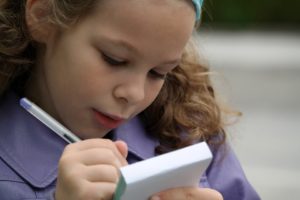 “I don’t have anything to write about Miss…” This phrase was all too familiar in my classroom when I began Writers’ Workshop. Regardless of the grade I taught, first, fifth, or eighth, the students would resist writing. It was the silent war between myself and the students, my enthusiasm to get them excited and immersed in writing against their frightened refusal to try. Who would win? Some years it really wasn’t pretty, but I know the benefits of students writing every day, so I persisted.
“I don’t have anything to write about Miss…” This phrase was all too familiar in my classroom when I began Writers’ Workshop. Regardless of the grade I taught, first, fifth, or eighth, the students would resist writing. It was the silent war between myself and the students, my enthusiasm to get them excited and immersed in writing against their frightened refusal to try. Who would win? Some years it really wasn’t pretty, but I know the benefits of students writing every day, so I persisted.
In a Writers’ Workshop, we want students writing every day on topics of their own choosing. We must help students realize that they do have stories to tell, that they have ideas worth sharing. In a writers’ notebook, students should jot down their possible writing topics, or seed ideas, and continue to do so throughout the year (ideas here from Ralph Fletcher).
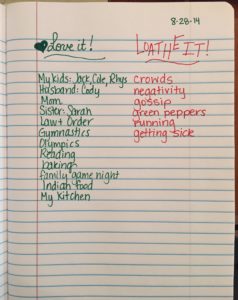 I teach students that the best writing comes from things that we are truly passionate about. Using the mini-lesson Love it! or Loathe it! from Marvelous Mini-Lessons for Teaching Intermediate Writing, I have students make a T-chart in their notebooks and list things they Love and things they Loathe. Of course, I model mine first. I make sure that my ideas and stories will interest the students and also be ideas they can relate to. See the picture of my writing notebook sample. I model for students writing things they love and loathe in the journal. Once modeled, the students create their own lists and of course share with classmates. Now they have a list of possible stories.
I teach students that the best writing comes from things that we are truly passionate about. Using the mini-lesson Love it! or Loathe it! from Marvelous Mini-Lessons for Teaching Intermediate Writing, I have students make a T-chart in their notebooks and list things they Love and things they Loathe. Of course, I model mine first. I make sure that my ideas and stories will interest the students and also be ideas they can relate to. See the picture of my writing notebook sample. I model for students writing things they love and loathe in the journal. Once modeled, the students create their own lists and of course share with classmates. Now they have a list of possible stories.
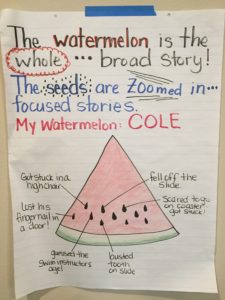 Many times the ideas listed are “watermelons”, meaning they are huge topics. For example, I list Cole, my son, on the Love It side. He is a “watermelon”. There are many stories I could tell about Cole, but I wouldn’t write them all in one paper! So for “Cole,” I will list all possible stories I have, for example, the day he got his finger caught in the door or the time he was trapped in a high chair. These are what we call “watermelon seeds,” or seed ideas. This is definitely one lesson that can be done during the first week of school, so the students will have ideas on hand to write about when it’s time.
Many times the ideas listed are “watermelons”, meaning they are huge topics. For example, I list Cole, my son, on the Love It side. He is a “watermelon”. There are many stories I could tell about Cole, but I wouldn’t write them all in one paper! So for “Cole,” I will list all possible stories I have, for example, the day he got his finger caught in the door or the time he was trapped in a high chair. These are what we call “watermelon seeds,” or seed ideas. This is definitely one lesson that can be done during the first week of school, so the students will have ideas on hand to write about when it’s time.
I’m a firm believer in “stock-piling” ideas. I want the students to have a whole arsenal of ideas ready, so I will never ever hear, “but, I have nothing to write about Miss …” again!
At the beginning of the year, I have always done some sort of “me bag” or show-and-tell that introduces the student to their classmates. It wasn’t until my last two years in the classroom that I turned this activity into a writing activity!
There are a couple of truths here.
- Kids LOVE talking about themselves and sharing their lives – even if they pretend they don’t!
- Stories that have been shared orally will almost write themselves!
 I begin the year by reading Wilfrid Gordon McDonald Partridge by Mem Fox. This is a really sweet story about a little boy who lives next door to an old age home. He loves Ms. Nancy the best because she has four names just like him. One day he overhears his parents say that Ms. Nancy is losing her memory. Wilfrid isn’t entirely sure what a memory is, so he asks all the folks at the home. Each person gives him a different answer, it’s something from long ago, it’s something that makes you cry, it’s something that makes you laugh, etc. In the end, he collects items for Ms. Nancy so she can get her memory back. Then I share with students my memories, as defined by the book. I share four items, my dad’s boot, my track and field record, a highchair, and a shattered mirror. As I pull each item, I explain the story (memory) making sure to tell it from beginning to end. I also explain if it’s a memory because it’s from long ago, or if it’s a memory because it makes me laugh, etc.
I begin the year by reading Wilfrid Gordon McDonald Partridge by Mem Fox. This is a really sweet story about a little boy who lives next door to an old age home. He loves Ms. Nancy the best because she has four names just like him. One day he overhears his parents say that Ms. Nancy is losing her memory. Wilfrid isn’t entirely sure what a memory is, so he asks all the folks at the home. Each person gives him a different answer, it’s something from long ago, it’s something that makes you cry, it’s something that makes you laugh, etc. In the end, he collects items for Ms. Nancy so she can get her memory back. Then I share with students my memories, as defined by the book. I share four items, my dad’s boot, my track and field record, a highchair, and a shattered mirror. As I pull each item, I explain the story (memory) making sure to tell it from beginning to end. I also explain if it’s a memory because it’s from long ago, or if it’s a memory because it makes me laugh, etc.
Next, I assign the students to bring in three to four objects that represent their memories. I provide a note to go 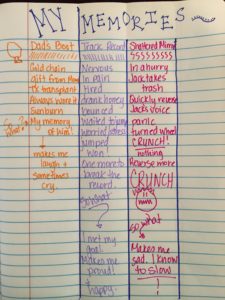 home that defines memories as in the book. The note also explains that students will need to be able to orally share the stories in order. When the students return to class, they are given opportunities to share their memories in their small group of four students. I make sure to circulate and listen to as many stories as possible.
home that defines memories as in the book. The note also explains that students will need to be able to orally share the stories in order. When the students return to class, they are given opportunities to share their memories in their small group of four students. I make sure to circulate and listen to as many stories as possible.
Once all memories have been shared, they add these “seed ideas” to their writer’s notebook. Making sure to model first, I make a four-column chart in my notebook. At the top of each column, I write each memory. Underneath, I show students how to make simple notes to remember the story in order. These will make fabulous stories because they are important memories to the student writer They listened to the story told by a family member, and they have already orally told their story to at least three classmates.
When we begin Writers’ Workshop routines in a week or two, students will now have four stories ready to go! If you teach an older grade, you might want to use the Matchbox Diary instead.
What is your favorite mentor text for gathering seed ideas?
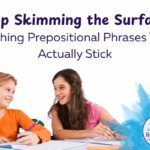

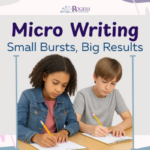
LOVE these ideas 🙂
Thank you!
Love this!! I use an actually watermelon for this lesson, so these are some amazing resources to add to the lesson! Thanks.
Love this!! I use an actual watermelon for this lesson, so these are some amazing resources to add to the lesson! Thanks.
You’re welcome! Have a great school year.
Love the idea! My students would always complain that they never have anything to write about and this would stop this problem.
I would love to hear how it goes! Have a great year.
it’s a great idea. Thank you.
I would like to share one of my latest work: Brainstorm Strategies infographic.
I really hope that it could be useful for schoolers and students.
http://goo.gl/q8g2yS
Can’t wait to try these in my classroom this year!
I love the watermelon lesson! After attending your Writer’s Workshop, I am excited to try out all of the wonderful ideas that you brought to us. Thank you!
You’re welcome! I hope you have a great year. I would also love to hear how the watermelon lesson goes in your class!